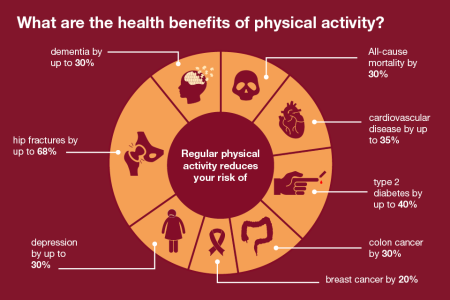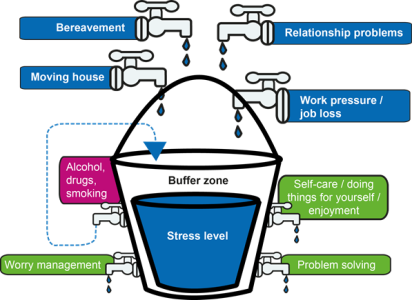How exercise can improve your mental health
Written by Elion Grajcevci.
Physical activity and mental wellbeing are closely linked. Sometimes the best thing we can do for our mental health is to get up and move around.
Being active is one of the five ways to wellbeing, which are a range of evidence-based practices shown to improve mental health and wellbeing.
How physical exercise can help mental health
Physical activity can do this in a range of ways: it raises self-esteem, encourages us by setting and achieving goals, and of course causing chemical changes in the brain that positively affect mood.
It can also improve mental health in a more indirect way, by strengthening our bodies and helping to keep them safe and healthy.

Many of the conditions shown here could potentially cause enough stress to negatively impact a person’s mental health. Exercising proactively reduces the risk of developing these conditions, so in a way it helps reduce the total stress over the span of our lives.
The idea of the stress bucket is useful here: everything in your life that causes stress adds more water to your bucket. Each of those conditions above could add a lot of water to it. Physical activity is like an umbrella that protects the buckets from overflowing.

How much exercise should we do to protect our mental health?
While nothing is guaranteed to protect our mental health, the UK Chief Medical Officers’ Guidelines recommend that adults should do the following weekly:
- at least 150 minutes moderate intensity activity, 75 minutes’ vigorous activity, or a mixture of both
- strengthening activities on two days
- reducing extended periods of sitting
Moderate intensity exercise
Moderate intensity activity will increase your heart rate and body temperature. If you can talk, but not sing whilst engaging in the activity, it is likely moderate intensity.
Examples include:
- brisk walking
- water aerobics
- riding a bike
- dancing
- doubles tennis
- pushing a lawn mower
- hiking
- rollerblading
Vigorous intensity exercise
Vigorous intensity activity will increase your heart rate further, as well as causing harder and faster breathing. You will struggle to speak without pausing for breath at this intensity.
Examples include:
- running
- swimming
- riding a bike fast or on hills
- walking up the stairs
- sports, like football, rugby, netball and hockey
- skipping
- aerobics
- gymnastics
- martial arts
Muscle strengthening exercise
Muscle strengthening activities might not cause hard and fast breathing the way vigorous intensity activities do. However, they will require you to take breaks after engaging in them before re-engaging.
Examples include:
- carrying heavy shopping bags
- yoga
- pilates
- tai chi
- lifting weights
- working with resistance bands
- doing exercises that use your own body weight, such as push-ups and sit-ups
- heavy gardening, such as digging and shovelling
- wheeling a wheelchair
- lifting and carrying children
Very vigorous exercise
Very vigorous activity can also contribute to your weekly physical activity. They are characterised by short bursts of maximum effort with intervals of rest.
Examples include:
- lifting heavy weights
- circuit training
- sprinting up hills
- interval running
- running up stairs
- spinning classes
If you are not currently meeting the physical activity guidelines, it is worth reflecting on what activities would be best for you to engage in. Consider what you might have enjoyed in the past or what you might enjoy now based on your preference and personality. For example, if you don’t enjoy the feeling of exertion associated with vigorous physical activity, but enjoy having a chat with a friend or family member, a brisk walk in the park with them might be a more enjoyable way to meet the guidelines, and one you’re more likely to engage in.
It is also worth thinking about the ways in which these activities can be fulfilling beyond just the exercise. Team sports such as football, basketball, and netball can help us meet new people. Even something as simple as moving the lawn helps improve your surroundings while getting exercise, or hiking lets us engage with nature and our surroundings in a meaningful way.
Engaging in physical activity can feel like a chore, another things that needs to be crammed into our already busy and tiresome week. However, there are real benefits both physically and mentally, that can help us enjoy a better quality of life for many years to come.
Resources
- Physical activity guidelines for adults aged 19 to 64 – NHS (www.nhs.uk)
- Physical activity guidelines: UK Chief Medical Officers’ report – GOV.UK (www.gov.uk)
- 5 Ways to Wellbeing | Mind – Mind
- The stress bucket – Mental Health UK (mentalhealth-uk.org)
Read more tips that can improve your physical and mental health, or learn why sleep is important for our mental health.
Sign up for our Newsletters
Sign up here for our monthly newsletters of mental health tips and advice, as well as to know what we’re up to.
We have newsletters for adults, children and young people, parents, and education staff.
Posted on: 30th May 2023

















